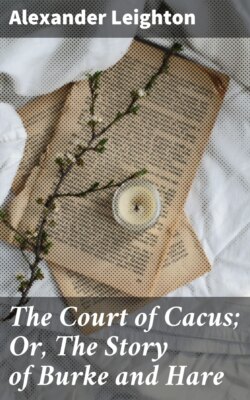The Court of Cacus; Or, The Story of Burke and Hare

Реклама. ООО «ЛитРес», ИНН: 7719571260.
Оглавление
Alexander Leighton. The Court of Cacus; Or, The Story of Burke and Hare
The Court of Cacus; Or, The Story of Burke and Hare
Table of Contents
PREFACE
First Appearance in Surgeon’s Square
Intercalary
The Young Amateurs
The Regular Staff
Sympathising Sextons, Doctors, and Relatives
Preying on each other
Resumption of the Great Drama
The Quaternion
The Opening of the Court—The Old Woman of Gilmerton.[5]
The Mother and Daughter
The Grandmother and the Dumb Boy
The Stray Waifs
The Relative
The Study for the Artist
Daft Jamie
The Brisk Little Old Woman
The Discovery
The Complicity of the Doctors
The Trial
The Jail
Vejove
The Exhibition
The Prosecution against Hare
The Hunt Out
The Final Cause
Отрывок из книги
Alexander Leighton
Published by Good Press, 2021
.....
The ardour of the study of anatomy was in the youth, and it was there from sympathy; yea, for years before, the Square and the College had been under the fervour of competition. Nor was this fervour limited to the Scottish metropolis, from which the fame of the successive Monroes had gone forth over the world. There had arisen Barclay, who, as an extra-academical lecturer, had the faculty of inspiring his students with all the zeal which he himself possessed, and to his class in the Square there had come students from England and Ireland, as well as foreign parts. Even in prior times, when the teaching was almost limited to the college, the reputation of the professors had so accumulated élèves that Scotland groaned, and groaned ineffectually, under the invasion of her sacred graveyards. The country teemed with stories, in which there figured the midnight adventures of those strange men who gained a living by supplying, at all hazards, what was so peremptorily required in the scientific hall and its adjacent rooms.[1] Anxious mourners visited by the light of the moon the places where their dear relatives lay entombed, as if they could thereby satisfy themselves that the beloved bodies still rested there in peace, though it was certain that the artists became in a short time so proficient in their work that they could leave a grave apparently as entire as it was at the time when the mourners deposited their burden. That these adventures should have taken strange and sometimes grimly-ludicrous turns might have been expected, and yet it is more true that they transcended belief.
There was one long current in Leven in Fife of a character more like fiction than truth. A middle-aged man of the name of Henderson had died of an acute fever, and was buried in due time. He left a widow and daughter, and we need not speak, even to those who have not experienced such privation, of the deep valley of grief through which it takes so long a time for the light of a living hope to penetrate, if, in some instances, it ever penetrates at all. Yet people must live, and the widow was to keep the small public-house in the skirts of the town which her husband had conducted. Six days had passed since the funeral, when one night, at a late hour, two men asked and got admittance for the purpose of refreshment, one of them, according to their statement, having been taken ill. They were introduced through a dark lobby into a room, where there was one of those close beds so common in Scotland, and left there with the drink they had ordered. By and by a loud knock came to the door, and the voice of an officer demanded to know if some thieves who had broken into a neighbouring house had there taken refuge. The noise and the impending search had reached the ears of the two men who had entered shortly before, and having had some good reason for being afraid of justice, they took advantage of a window and got out, but they had made so much noise in their flight, that the officers were directed to a pursuit, in which, however, they ultimately failed. On their return they thought of examining the room, with a view to ascertain whether the supposed thieves had left in their hurry any of the booty; but all that they found was an empty bag, which they took away with them for the purpose of an expected identification. The confusion having ceased, the widow, in the depth of her grief for her departed husband, went into the room to betake herself to bed. She approached it for the purpose of folding it down, and in an instant was transfixed; before her on the bed lay the dead body of her husband in those very grave-clothes made by her own hands, and in which, six days before, he had been buried. The explanation of the mystery was not difficult. The two men belonged to the College staff of body-snatchers; they had succeeded so far in their enterprise, and would with their burden have avoided all houses, if one of them had not been taken ill, and the other had not also wanted to participate in a restorative after their night’s work. It is supposed that, thinking themselves secure in the quiet house, they had taken the body out of the sack for some purpose only known to themselves, and thinking, when the noise got up, that the pursuit was after them, they had flung it into the close bed and flown.
.....